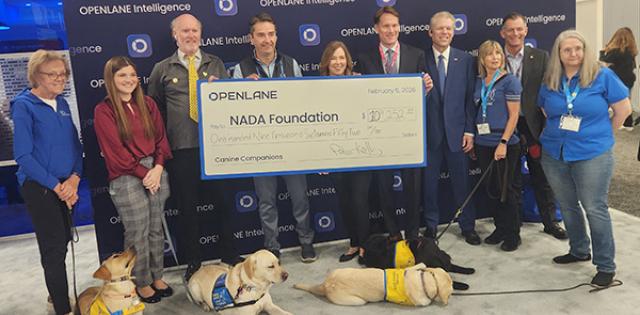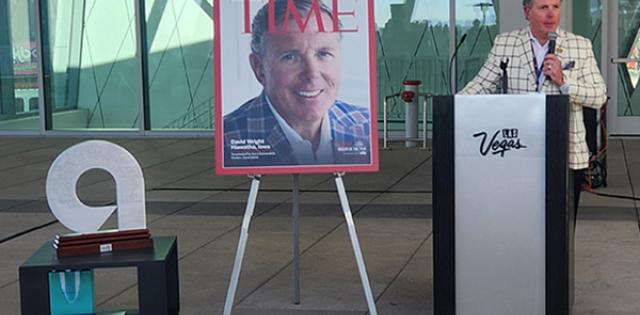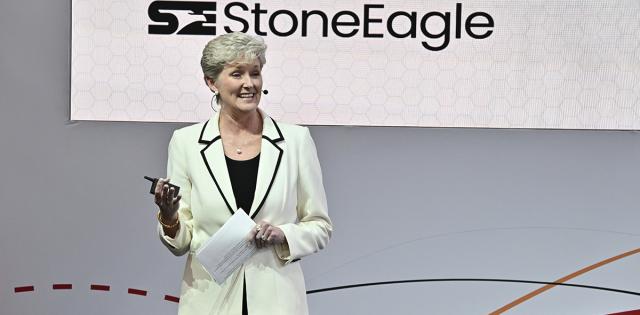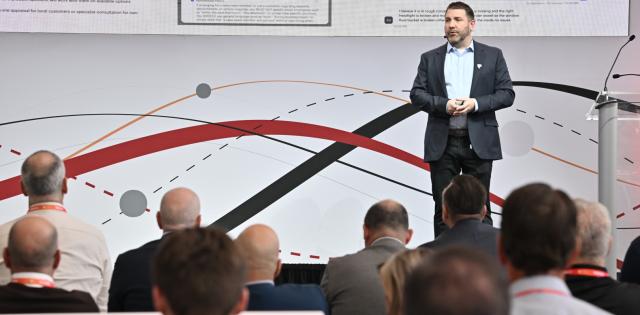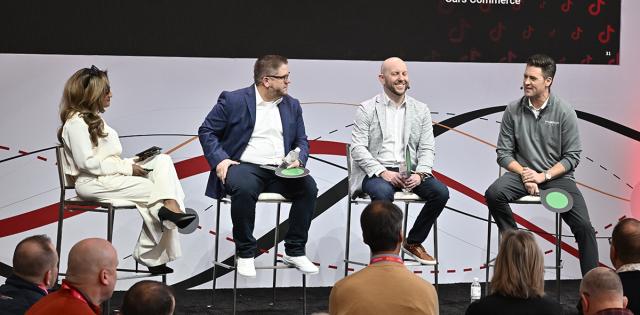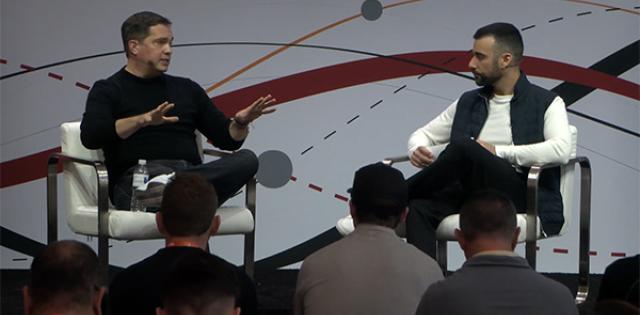The Good Fight
How NADA works for dealers in Washington, D.C.
Every day on Capitol Hill and in the regulatory agencies in Washington, D.C., policymakers are making decisions that have the ability to greatly affect local auto dealerships and the millions of customers they serve. But dealers have always had a powerful advocate in NADA.
“One of our strengths is our connection with Main Street, the small-business community, and one of the biggest industries in the world,” says 2023 NADA Chairman Geoffrey Pohanka.
“And NADA has a fantastic aparatus for educating policymakers about the impact of their ideas on business owners, employees and consumers.”
While proposed legislation, public policies and agency rules may differ from one presidential administration or Congress to the next, the NADA mission remains the same: to educate policymakers about the franchised dealership business model, to engage stakeholders about the importance of a vibrant automotive retail industry, to communicate dealer interests to our manufacturer business partners, and to protect dealers and their millions of customers from harmful or misguided public policies.
FTC SHOULD RETHINK PROPOSED VEHICLE SHOPPING RULE, SAYS NADA
If there was one regulatory issue that has dominated NADA’s efforts this year, it has been the Federal Trade Commission’s (FTC) proposed vehicle shopping rule. In fact, the entire NADA team, as well as state and metro dealer associations and NADA dealer members, have pushed back hard on the proposed rule.
The proposed rule would require auto dealers to provide more rigorous cost-disclosure requirements for certain fees as well as financing, marketing and advertising practices. It would create a whole host of new burdensome and redundant disclosures and forms throughout the sales process, extending the vehicle purchase process and creating a much more complex process for both customers and dealers.
“The FTC’s proposed rule would make the auto-buying experience worse, not better, for consumers,” says NADA President and CEO Mike Stanton. “As the auto industry works to streamline the purchase process in the aftermath of the pandemic, the FTC’s approach would swamp dealers and car buyers with greater inefficiency and complexity.”
Usually, when a rule of this magnitude is under consideration, a federal agency prudently conducts cost-benefit analysis, research and testing to ensure a proposed rule would work in practice. But in this case, the FTC issued the proposed rule without performing any consumer testing or providing valid evidence to justify the need for these additional regulations. In coming up with the proposed rule, the FTC has admitted that it relied on an unverified, qualitative, internal complaint database that included consumer complaints about businesses like rental car companies and industries not even tied to auto retail.
“It is the worst-prepared proposed rule I’ve ever seen put out by a federal agency,” said NADA’s Senior Vice President of Regulatory Affairs Paul Metrey during NADA’s Washington Conference in September.
NADA continues to urge the FTC to go back to the drawing board and utilize a more tested and data-driven approach to its policies. Furthermore, NADA has called on the FTC to work collaboratively with the auto industry, as it has in the past, to stop any unfair and deceptive practices and promote legal compliance without unnecessarily lengthening transaction times and harming consumers.
NADA Fights Back Against Catalytic Converter Theft
Crime rings have found a new way to generate hundreds of millions of dollars in ill-gotten revenue: stealing catalytic converters. The National Insurance Crime Bureau estimates that last year alone over 52,000 catalytic converters were stolen nationwide, whereas in 2018, for instance, there were only 1,300 such thefts reported.
NADA has heard about these thefts from several of its dealer members, including Jim Basil of Basil Family Dealerships in Buffalo, N.Y. “In the last 60 days, we’ve had more catalytic converter thefts than in the previous 10 years,” Basil says, noting that at least eight of his commercial truck customers have recently been victims of this type of theft.
In November the Justice Department announced the takedown of a nationwide catalytic converter theft ring, but more needs to be done. NADA supports H.R. 6394, the Preventing Auto Recycling Theft (PART) Act, which includes a $7 million grant program through which certain entities can voluntarily stamp VINs, or other identifiers, onto the catalytic converters of vehicles already on the road at no cost to vehicle owners.
The bill also requires new vehicles to have unique, traceable identifying numbers stamped on catalytic converters at the time of assembly. Additionally, the bill increases recordkeeping requirements for purchasers and establishes a federal criminal penalty of up to five years in jail for the theft, sale, trafficking or known purchase of stolen catalytic converters.
NADA Calls for Accounting Relief
Many dealers have long used LIFO (last in, first out) as the inventory accounting method to calculate taxes and mitigate rising inventory costs, such as those caused by the pandemic and related supply chain issues. Without LIFO relief, dealers face much larger tax bills.
The Treasury Department has existing authority to allow LIFO relief to businesses if a “major foreign trade interruption” makes inventory replacement difficult. NADA strongly supported the Supply Chain Disruptions Relief Act (H.R. 7382/S. 4105), which would give Treasury the authority to provide LIFO relief to the auto sector for tax years 2020 and 2021.
With strong bipartisan support from members of Congress in both the House and the Senate, the outlook for legislative relief remains promising. The Treasury Department recently indicated its support for a legislative solution to this issue and pledged to cooperate with Congress to that end.
Advancing Education
How NADA is developing talent online and in person.
From Academy classes to 20 Groups, from conferences and events to workshops, seminars and industry-leading original research, NADA continues to deliver programs and services designed to enhance the success and sustainability of the auto retail industry and its members.
“NADA’s most popular educational and professional development programs continue to evolve and grow as the industry and technology changes, as seen, for example, through our incredibly popular online Academy option,” says 2022 NADA Chairman Mike Alford. “Dealers have a long history of adapting to challenges by learning as much as they can and staying flexible, and the new virtual Academy helps them do both.”
NADA ACADEMY LIVE VIRTUAL CLASSROOM
It’s the silver lining of the pandemic—the introduction of the NADA Academy Live Virtual Classroom. In 2022, approximately 20% of Academy students attended courses online, and total Academy enrollment increased from some 500-600 students per year to 735 full-time students.
With the virtual classroom, students attend three hours of class, once or twice a week during six monthlong sessions, while in-person classes take place during six one-week sessions over the course of the year.
“NADA Academy online was among the most important and impactful educational pursuits of my automotive career,” says Sam D’Arc, chief operating officer at Zeigler Auto Group in Kalamazoo, Mich. “The course incentivizes ‘doing’ immediately after ‘learning.’ What resulted were multiple implemented solutions to unfolding, market-related issues we may not have otherwise so quickly addressed. In short, the course was money and time well-invested.”
The virtual option is also reaching an entirely new pool of students who haven’t been able to attend the in-person Academy. “I’ve wanted to attend the Academy for so very long, but I couldn’t take the time to be out of the stores for a week at a time several times per year,” says Keith Powell, dealer at Yes Chevrolet in Hurricane, W.Va., and Yes Ford in Huntington, W.Va.
A big part of Academy is the networks that develop among students. NADA instituted a system called Yellow Dig, sort of a Facebook for Academy classes, to help dealers bond with each other.
Powell, who graduated in October 2022, has high praise for the networking platform: “I initially had concerns about not having the relationships with my classmates and instructors that all of my friends had when they attended in person. I can now tell you that I have made some of the greatest relationships with so many of my classmates from the Academy.”
The virtual Academy will continue to complement the in-person Academy as long as it’s popular, with eight more sessions currently scheduled for 2023. NADA is watching how quickly those classes fill up and has the ability to add in more classes as needed.
STAYING ENGAGED AFTER ACADEMY
As the Academy curriculum continues to evolve, so does engagement after graduation and helping students get on the road to meeting their post-Academy objectives in the dealership. Starting in July, Academy graduates will have virtual follow-ups two and four months after their graduation, as well as an in-person follow-up at the six-month mark. These important follow-ups will help ensure that graduates are implementing all the education they learned and are able to track their improvements.
New Academy graduates can also continue their networking and education in a new peer-to-peer program called NADA Engage. These Engage members will have the opportunity to participate in ongoing discussions throughout the year at the time and frequency of the group’s choosing, and will travel to NADA headquarters once a year to stay up to date on everything NADA is doing. There will be three pilot Engage groups launching in-person meetings in early 2023, including in Washington state.
Some Academy graduates previously had expressed a desire to have a type of program like this, so once the three Engage groups are up and running, NADA will reach out to past graduates to gauge their interest.
NADA SEMINARS TAKE OFF
Last year, NADA introduced a new NADA Education Subscription option—a powerful tool for providing continual training and development to dealership employees, all for the price of a single monthly car payment.
One of the NADA seminars available through the Education Subscription or as an individual a la carte option is the new Essential Service Advisor Training. In fact, this interactive class has proven so successful online that it will be offered in person as well, on February 21 and 24 in conjunction with the Washington State Auto Dealers Association.
In addition, two new seminars will launch at NADA Show: Digital Marketing Bootcamp and Talent Management—From Recruitment Through Retention. The Digital Marketing Bootcamp program is geared toward training digital marketers on how to optimize the new version of NADA Analytics, while the Talent Management class will focus on recruiting, hiring, onboarding, developing and retaining employees.
With NADA’s expansive interactive learning and networking offerings, and the relationships built inside and outside the classroom, there’s never been a better time for current and future dealership owners and managers to advance their own individual growth and success while shaping the future of the industry.
NADA’s Guiding Principles
A look at evolving business models and the future of the dealer franchise system.
From what cars are sold to how they are sold, the dealer franchise system has constantly adapted and innovated over its hundred-plus-year history to create an unparalleled customer experience at the dealership.
“When it comes to selling cars in 2023, one thing we hear from dealers everywhere is clear: Auto retail is changing faster today than it has at any time since the dawn of the franchise system,” says NADA President and CEO Mike Stanton. “Selling and servicing cars in the future will not look like it did 30, 20 or even 10 years ago. The days of taking inventory from OEMs and selling as a lone wolf are over.”
Similarly, NADA as an organization has evolved to meet auto dealers’ needs and help dealers meet the future head-on. With that future in mind, NADA has unveiled its “Guiding Principles on Evolving Business Models and the Dealer Franchise System.”
The principles—based on two years of conversations among NADA leadership, state and metro ATAEs, dealer councils, and NADA’s OEM counterpart trade association, the Alliance for Automotive Innovation—clearly articulate NADA’s position on the major issues affecting the dealer franchise system, as well as common core values that dealers and manufacturers agree on. “Our goal is to move the industry toward recognition and acceptance of these principles, help dealers and OEMs work to improve the customer experience, and make the pie bigger and better for everyone,” Stanton says.
The final principles, which rolled out this summer, are supported by the NADA board, as well as state association partners and OEMs with whom they have been shared.
“I see us—dealers and OEMs—as two necessary components of a single automotive ecosystem,” says 2022 NADA Chairman Mike Alford. “In this single ecosystem, where the retail and manufacturing channels coexist, we can bring about a customer experience that will be the envy of every other industry in the world. Moving toward this approach brings opportunity for everyone.”
DEALER FRANCHISE SYSTEM AND EVOLVING BUSINESS MODELS
NADA’s first principle is recognition and support of evolving business models and the dealer franchise system: “NADA and its dealer members recognize that the franchise dealership model is in a period of dynamic evolution, driven by technology and increased expectations of the consumer experience. NADA supports the dealer franchise system as the most consumer-friendly, efficient and effective model of distribution for motor vehicles—ICE or BEV—in the United States. NADA believes both dealers and OEMs should publicly recognize and acknowledge these facts.”
DOWNSTREAM REVENUES
The next principle concerns downstream revenues—an area of particular concern among OEMs, according to 2023 NADA Chairman Geoffrey Pohanka, who is a member of a 20 Group for multifranchise dealers and was instrumental in helping create the Guiding Principles. “I was able to hear some of the concerns manufacturers have about auto dealers and the franchise system,” Pohanka says. “For example, manufacturers were worried that dealerships will prevent over-the-air updates” because it means fewer service visits to the dealership.
In its principles, NADA states that the organization is for dealers working with their OEMs regarding downstream revenue/subscription/activation services to enhance the customer experience and create win-win solutions for dealers and OEMs. But NADA is against OEMs selling vehicle features directly to consumers without dealer involvement and revenue sharing.
RESERVATIONS AND VEHICLE ALLOCATIONS
When it comes to reservations and vehicle allocations, NADA’s principles call for a reservation and ordering system that embraces the franchise model. That includes reservation ordering programs when the orders are placed through local dealerships that consumers choose, transparent pricing and delivery policies, and a requirement that OEMs and dealers honor commitments made at time of order.
DATA SHARING
Data sharing has been a major sticking point between dealers and OEMs, Pohanka says. “Data sharing is very important and valuable to the manufacturer. At the same time, we have to be careful what we share outside the dealership ecosystem.”
In its Guiding Principles, NADA has agreed that data should be shared and that dealers and their customers should be protected: “We support dealers working with their respective OEMs to determine an optimal customer experience that creates win-win scenarios for dealers and OEMs. But we are against third-party vendor agreements that do not take dealer protections into account, and we are against one-sided OEM agreements that consider only OEM interests.”
BUSINESS EFFICIENCIES
In the principles, NADA recognizes that there may be inefficiencies that could be eliminated in order to help further improve customer satisfaction. That’s why the organization and its members are supporting identifying efficiencies that may lead to a reduction in costs associated with distribution. But NADA says it is opposed to OEM-to-dealer cost shifting that benefits OEMs only.
The overall goal of these Guiding Principles is to provide a pathway for the franchise system to continue flourishing as the best system for selling and servicing new vehicles. NADA is 100% focused on ensuring that dealerships are resilient, innovative and able to nimbly adapt—not only today, but also for future generations.
For more stories like this, bookmark www.NADAheadlines.org as a favorite in the browser of your choice and subscribe to our newsletter here:



